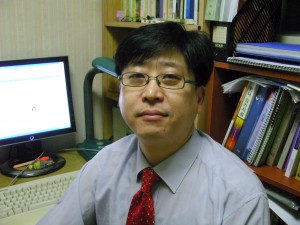Each week Emerging Markets ESG publishes an interview entitled, “Five Questions about SRI.” The interview features a practitioner’s insights about SRI in emerging markets and through Emerging Markets ESG shares this expertise with a wide global audience. The goals of Five Questions about SRI are fourfold:
- To collect a catalogue of examples of SRI in practice in emerging markets;
- To raise awareness about SRI in emerging markets;
- To reflect on what SRI in emerging markets means to practitioners; and
- To enable SRI practitioners in emerging markets to network with peers around the world.
This week’s interview is with Joowon Park, Executive Director, Korea CSR Research Service (KOCSR), Seoul, South Korea.
Korea CSR Research Service (KOCSR) was launched as an affiliated research centre with CCSR (The Center for Corporate Social Responsibility) in June 2007. It became an independent ESG research company in July 2008 with four shareholders, which are independent stakeholders from the SRI market, including CSR institutes, NGOs and religious organizations. As a Partner of EIRIS Global Platform, it researches Korean, Chinese and HK/Singapore companies. Joowon Park is the Executive Director of KOCSR. His recent work includes “An Analysis of Human Rights Policies and Management Practices of Major Korean Corporations and a Study of Korean-style Business Human Rights Guidelines” and “The Study of CSR Practices of Major Korean Corporations through Quantitative Analysis.” Previously Park worked as a consultant for NPO, a religious organization. From 2003 to 2006 he worked at CCSR as a vice secretary-general and head of the research team. His main work was the promotion of creating a CSR report law with other Korean NGOs, shareholder activism in order to promote the publishing of CSR reports concerning Korean companies including SAMSUNG and LG Electronics, assessment of Korean companies’ CSR reports based on GRI guideline and the development of SRI funds with Korean religious groups. He has a Master’s degree in economics from Graduate School of Kookmin University. From 2009 to 2012, Park co-led the Korea team in the Emerging Market Disclosure Project (EMDP), together with Lauren Compere at Boston Common Asset Management. He is a member of the Korean PRI network steering committee.
Emerging Markets ESG: How would you define socially responsible investment (SRI)?
 Joowon Park: It’s a consequence of humanity’s self-examination over the disastrous impact of profit maximization. SRI is an alternative investment of good faith agreed by humanity for limiting the excessive profit maximization of large enterprises and creating a structure of sustainable economy.
Joowon Park: It’s a consequence of humanity’s self-examination over the disastrous impact of profit maximization. SRI is an alternative investment of good faith agreed by humanity for limiting the excessive profit maximization of large enterprises and creating a structure of sustainable economy.
Emerging Markets ESG: What distinguishes SRI from mainstream investment?
Joowon Park: Mainstream investment is based on a belief that profit maximization is what brings happiness and utility to the whole group of stakeholders. By contrast, SRI is based on a different belief that the company’s performance related to employees and environment are as important as financial performance, and that social and environmental performance will eventually lead to profits.
Emerging Markets ESG: Which extra-financial theme – environmental, social or governance – is the most challenging for companies in South Korea to manage?
Joowon Park: It’s a very difficult question, but I believe that it is governance, because South-Korea is heavily dependent on large enterprises, the majority of which have a particular type of corporate governance called “chaebol” – family-managed conglomerates. A biased decision taken through such outdated governance may harm the entire economy as well as the company itself.
Emerging Markets ESG: Which extra-financial theme – environmental, social or governance – is the most challenging for investors in South Korean companies to analyze?
Joowon Park: Also governance, I think. Most South Korean ESG research organizations are in partnership with foreign global ones and assess companies based on the latter’s research methodology. Because the methodology is based on global standards, it could be more or less insufficient for analyzing the chaebol structure of South-Korean companies. Even with a customized methodology, it is challenging to assess a chaebol groups’ internal decision-making system and/or relevant risks through objective indicators, because the decisions often reflect personal beliefs of the group’s head or family.
Emerging Markets ESG: Which institutions and which issues are driving SRI in South Korea today?
Joowon Park: South-Korea’s current major SRI driver is the National Pension Service (NPS). NPS has been increasing the size of SRI mandates since it became a PRI member, and is exerting effort on the establishment of the monitoring system for outsourced assess management companies and guidelines for the voting rights at companies. Given the NPS’s influence on asset management companies, its future SRI policies and actions may affect the entire South Korean financial market.
But, because NPS is under the strong control of the South-Korean government, its future SRI policies will depend on which political party comes to power via the upcoming presidential election. If a progressive political party wins the election, the SRI activities undertaken by NPS will expand even more rapidly, and the engagement with companies will most likely become more proactive.
Nonetheless, it is too early to make a hasty conclusion about possible changes at NPS; due to its great role as an owners on the Korean stock market and the diverse group of its stakeholders, composed of both companies and employees, it always considers the impact of its SRI policy on the society as a whole. Thus, it changes the speed of its SRI policy very slowly. Moreover, NPS’s future directions may arouse controversy because many different opinions exist concerning its SRI strategy.